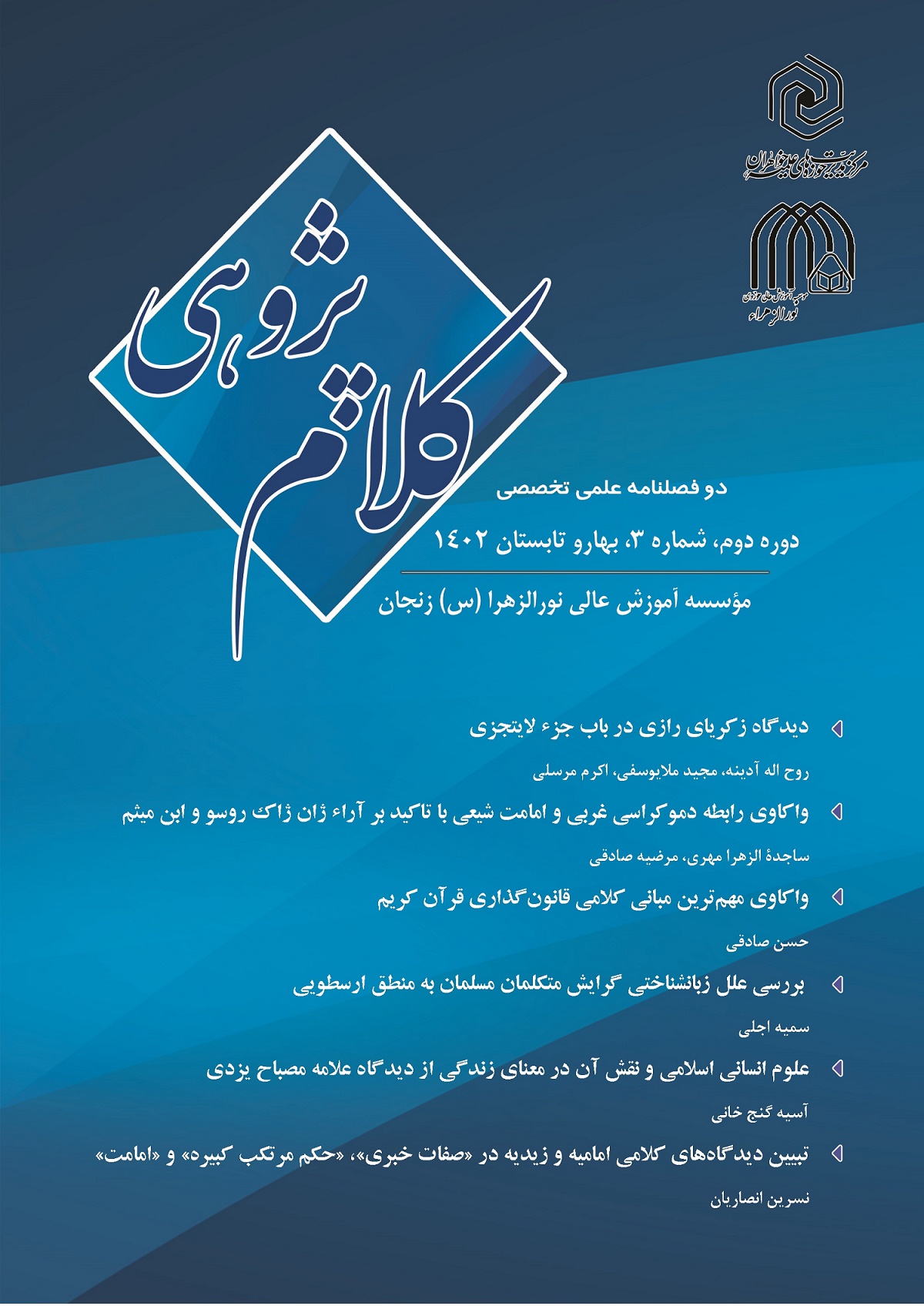نوع مقاله : مقاله پژوهشی
نویسندگان
1 دانش آموخته دکتری فلسفه و کلام اسلامی، دانشگاه زنجان، زنجان، ایران. استاد مدعو دانشگاه زنجان. دانشکده علوم انسانی. گروه فلسفه .
2 استاد گروه فلسفه دانشگاه زنجان
3 دانشیار گروه حکمت و کلام دانشگاه شهید بهشتی، تهران، ایران
چکیده
رستگاری و سعادت انسان از جملة مهمترین موضوعاتی است که فیلسوفان اسلامی به آن پرداختهاند. ملاصدرا نیز به عنوان فیلسوفی که در بستر سنّت دینی و عقلانیِ شیعیِ بالیده است، در نظامِ الهیاتی و فلسفی که در کتاب الاسفار الاربعه طراحی میکند به دنبال چگونگیِ تحقق رستگاری انسان است. با توجه به بررسیهای انجام شده شاهد آن هستیم که ملاصدرا رستگاری انسان را در گروِ دو مؤلفه میداند که عبارتند از: فرشتگان و نبی اسلام. این رویکرد ملاصدرا این نتیجه را به دنبال دارد که فرشتگان باتوجه به جایگاه هستیشناختی و معرفتشناختی که دارند در دو ساحت علمی و عملی، دو بال اصلیِ رستگاری انسان را مهیا میکنند و هویتّ انسانِ رستگار را تَشخُّص میبخشند و انسان را به موجودی فرشتهوارْ مبدّل میسازند. در عین حال، در عرصه بال عملیْ با دو عنصرانتقال وحی و نیز یاریرسانی کلی به انسان مواجهیم که نقش نبی اسلام در عرصه وحی بسیار مشهود و اثرگذار است. به زعم ملاصدرا فرشتگان هویت سازی انسان را بر عهده دارند و رستگاری عبارت از تحققِ کمال علمی و عملی مؤمن است که در اتصال و اتحاد با عقل فعال و عمل به شریعت حاصل میشود. در این پژوهش به شیوه تحلیلی- توصیفی و بر مبنای آثار ملاصدرا به بررسی این مسأله میپردازیم که نقش فرشتگان در رستگاری انسان در اندیشه ملاصدرا چیست و چگونه حاصل میشود.
کلیدواژهها
عنوان مقاله [English]
The role of angels in the salvation of man in Mullah Sadra's thought
نویسندگان [English]
- Ali Moradi 1
- sahar kavandi 2
- mohsen jahed 3
1 humanity faculty. uinversity of zanjan. de[artment of philosophy. zanjan. iran
2 . Professor of Islamic Philosophy and Theology Department, University of Zanjan, Iran
3 Associate Professor of Philosophy and Theology Department, Shahid Beheshti University, Iran
چکیده [English]
Human salvation and redemption are among the most important topics that Islamic philosophers have addressed. Mulla Sadra, as a philosopher who is based on the religious and intellectual tradition of Shia, is looking for how to realize the salvation of man in the theological and philosophical system that he designs in the book of the Al Asfar AlArbaa. According to the studies done, we see that Mulla Sadra believes that the salvation of man depends on two components, which are: angels and the Prophet of Islam. This approach of Mulla Sadra leads to the conclusion that angels, according to their ontological and epistemological position in both scientific and practical fields, provide the two main wings of human salvation and identify the redeemed human identity and make man an angelic being. They make a change. At the same time, in the field of practical wing, we are faced with the two elements of transmission of revelation and general assistance to humans, which the role of the Prophet of Islam in the field of revelation is very visible and effective. According to Mulla Sadra, angels are in charge of creating a human identity, and salvation is the realization of the believer's scientific and practical perfection, which is achieved by connecting and uniting with the active intellect and practicing the Sharia. In this research, in an analytical-descriptive way and based on Mulla Sadra's works, we investigate the issue of what is the role of angels in the salvation of man in Mulla Sadra's thought and how is it achieved.
کلیدواژهها [English]
- Mulla Sadra
- angels
- Prophet of Islam
- active intellect
- revelation
- knowledge

